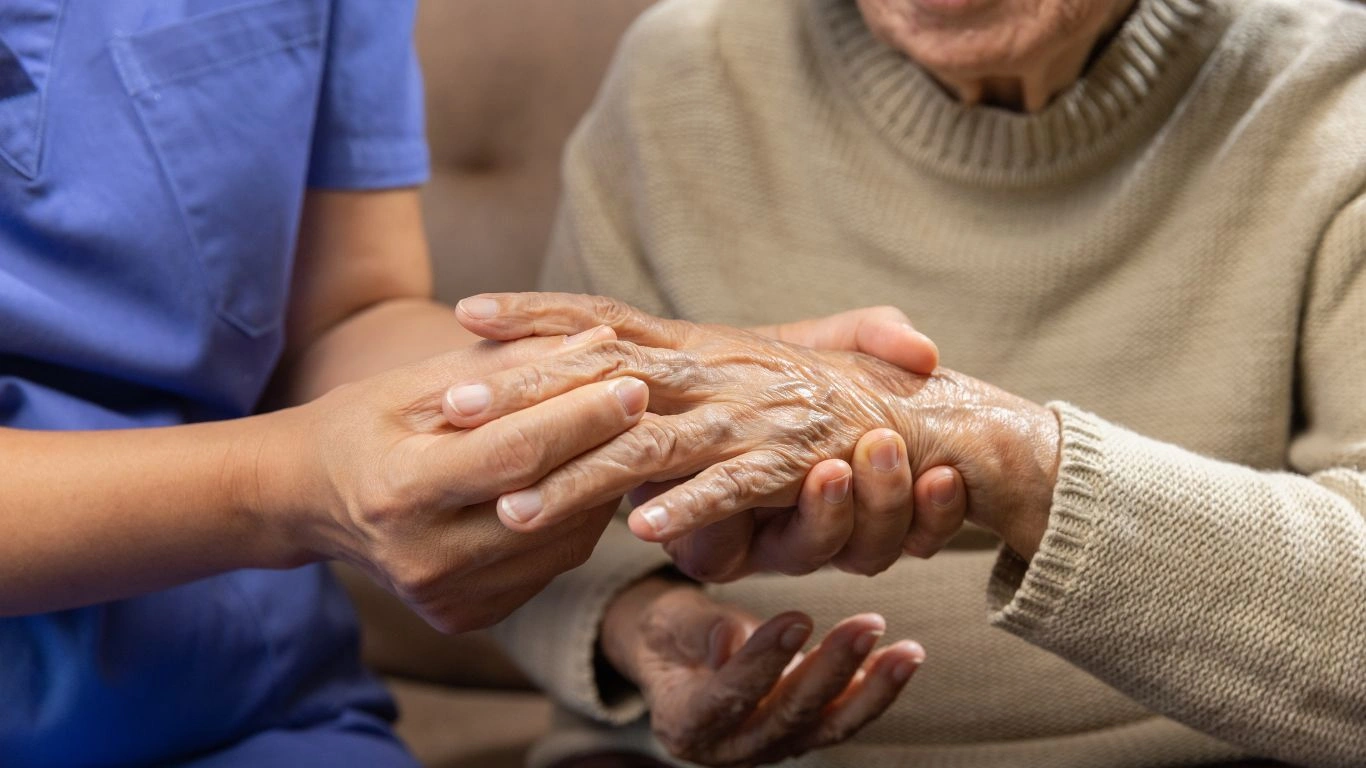How Rheumatoid Arthritis Affects Mental Well-Being: Impact on Emotions
Rheumatoid arthritis (RA) is often associated with physical symptoms, such as joint pain, swelling, and fatigue. However, the impact of this chronic condition goes far beyond what we see on the surface. As a healthcare professional specializing in the management of rheumatoid arthritis, I have witnessed firsthand how this autoimmune disorder profoundly affects mental well-being. If you or someone you care about is dealing with RA, understanding its mental health implications can be a game-changer when it comes to treatment and managing daily life.
How Rheumatoid Arthritis Affects Mental Well-Being
When we think about rheumatoid arthritis, we usually think about the pain, the swelling, and the physical discomfort. What many people don’t realize, however, is that the effects of RA extend far beyond the physical. The emotional and mental toll can be just as debilitating, and in many cases, even more challenging to deal with. As someone who’s worked with countless patients over the years, it’s clear that the mental health effects of RA are often underestimated.

The Emotional Impact of Chronic Pain
The most obvious way that rheumatoid arthritis affects mental well-being is through the emotional response to chronic pain. When you’re in constant pain, it’s not just your body that suffers—your mind does too. It’s hard to feel positive when you’re constantly battling fatigue, stiffness, and pain that won’t go away. Over time, this can lead to feelings of frustration, helplessness, and even despair.
One of the things I’ve seen in my practice is how the emotional response to pain can spiral. Many of my patients express feelings of isolation, which can result in depression. The inability to participate in everyday activities because of pain can make people feel disconnected from the world around them. I’ve had patients tell me they feel like they’re missing out on life, watching others enjoy things they can no longer do themselves. It’s a difficult mental struggle that often gets overlooked.
The Link Between RA and Anxiety
It’s not just depression that affects people with rheumatoid arthritis. Anxiety is also a common companion. The unpredictability of flare-ups can leave people feeling constantly on edge. They might worry about the future and how their condition will evolve. Will they be able to keep up with their career? Will they be able to play with their kids? The uncertainty of how the disease will progress is a huge source of stress for many RA patients.
From my experience, anxiety also tends to feed into the physical symptoms of RA. Stress can actually trigger flare-ups, and this creates a vicious cycle. The more anxious someone becomes about their health, the more they stress their body, and the worse their symptoms get. It’s a lot to manage, and it’s something that I work hard to help my patients cope with on a mental and emotional level.

Social Isolation: A Hidden Consequence
Another mental health challenge that often accompanies rheumatoid arthritis is social isolation. When you’re dealing with the pain and limitations of RA, you might withdraw from social activities. This might start as a conscious decision to avoid situations where you’ll be too fatigued or in too much pain, but over time, it can become an unconscious habit. This isolation can lead to feelings of loneliness, which can further exacerbate depression and anxiety.
I’ve seen this happen so many times in my practice—patients who once enjoyed going out with friends or spending time with family members suddenly find themselves avoiding social gatherings. It’s not that they want to be alone, but the physical and emotional toll of RA becomes overwhelming. Sometimes, they don’t even realize how much they’ve withdrawn until it’s pointed out to them. Helping patients re-engage with their social lives, even in small ways, is an important part of my work as an RA specialist.
The Impact of Medication on Mental Health
As if living with rheumatoid arthritis wasn’t challenging enough, the medications used to treat the condition can also have a significant impact on mental health. Many of the drugs prescribed for RA, such as corticosteroids, have side effects that can contribute to mood swings, anxiety, and even depression. I’ve had patients report feeling more emotional, stressed, or even a sense of detachment while on these medications. While these medications are necessary to control inflammation and prevent joint damage, they can sometimes exacerbate mental health issues.
It’s a tricky balance. As a healthcare provider, I aim to help patients find the right treatment regimen that not only manages their physical symptoms but also considers their mental well-being. If a patient is struggling with side effects from their medications, it’s important to talk about alternative treatments or support strategies that can help alleviate some of these concerns.

Finding Balance: Managing Mental Health with RA
Managing mental health while dealing with rheumatoid arthritis requires a comprehensive approach that addresses both the body and the mind. For many of my patients, the key lies in finding a balance between physical treatment and mental health support. This can include therapy, stress management techniques, and medication adjustments. It’s important to recognize that mental health is just as important as physical health when it comes to treating RA.
If you’re struggling with the mental health effects of rheumatoid arthritis, please know that you’re not alone. It’s common, and it’s okay to ask for help. Whether it’s talking to a therapist, joining a support group, or finding new ways to manage stress, there are options out there to help improve your mental well-being while living with RA. If you’re unsure where to start, reach out to your healthcare provider—they’re there to support you, both physically and emotionally.
Building a Strong Support System for RA
As someone who’s seen the profound effects of rheumatoid arthritis on my patients’ lives, I can tell you that building a strong support system is essential. Whether it’s family, friends, or even online communities, having people around who understand what you’re going through can make a world of difference when it comes to managing both the physical and mental aspects of RA.

The Role of Family and Friends
Your loved ones can be your greatest support system, but it’s important for them to truly understand what you’re going through. I’ve seen patients who’ve struggled because their friends or family members didn’t recognize the emotional impact of RA. Sometimes, those around us only see the physical symptoms, and the emotional struggles can be harder to explain.
As a rheumatoid arthritis expert, I encourage my patients to have open conversations with their families about what they need emotionally and mentally. For instance, if you’re dealing with fatigue and need some help with household chores, ask for it. If you need some emotional space or someone to talk to, speak up. The key is to communicate your needs and make sure that your support system is on the same page.
One thing I always tell my patients is that it’s okay to lean on others, but also to make sure that you’re offering some understanding in return. Sometimes, family members may not know how to help, so talking about it and keeping those lines of communication open can be hugely beneficial for everyone involved.
Coping Strategies for Mental Health
Alongside the support of loved ones, there are various coping strategies that can help manage the mental health challenges associated with rheumatoid arthritis. As someone who works closely with people affected by RA, I know that everyone is different, so it’s important to find what works best for you. Below, I’ll share some coping mechanisms that have helped many of my patients and myself.

Mindfulness and Relaxation Techniques
One of the best tools I recommend for managing stress and mental well-being is mindfulness. It may sound a bit “out there” to some, but the benefits are real. Techniques like deep breathing, meditation, and even yoga can help reduce anxiety, improve your mood, and give you a sense of control over your body and mind. It’s all about being present in the moment and not letting the stress and worry take over.
From my experience, mindfulness can also help ease the physical symptoms of RA. When you focus on your breath or a relaxing thought, it’s easier to disconnect from pain, even for a brief moment. I’ve had patients tell me that they feel a sense of peace and relief after practicing deep breathing or guided meditation, which I believe is a powerful part of the healing process. It doesn’t cure the pain, but it certainly helps in managing it.
Physical Activity: A Double-Edged Sword
It may seem counterintuitive, but physical activity can actually benefit both your physical and mental health when it comes to rheumatoid arthritis. Exercise helps manage the stiffness and pain in the joints, but it also boosts mood. When you’re able to move and stretch, your body releases endorphins—those “feel-good” hormones that help combat anxiety and depression.
Of course, I know that some days are harder than others, and not every RA patient feels like hitting the gym or going for a walk. But even gentle stretching or low-impact exercises, like swimming or tai chi, can make a huge difference. I’ve worked with several patients who’ve experienced less pain and a better mood after incorporating light exercise into their routines. Plus, you don’t have to do it alone! Group classes or walking with a friend can be both social and therapeutic.
Professional Help: Therapy and Counseling
While support from friends and family is essential, there are times when professional help is necessary. If you’re struggling with depression, anxiety, or overwhelming stress, seeing a therapist or counselor can be an important step in improving your mental health. Talking to someone trained in handling the mental health challenges associated with chronic illness can provide relief and give you tools to better cope.
In my experience, therapy can help patients reframe their mindset, deal with emotional distress, and learn new coping mechanisms. Cognitive-behavioral therapy (CBT), in particular, has shown to be effective for people living with chronic conditions like RA. CBT helps individuals identify and challenge negative thought patterns and replace them with more positive, realistic ones. This can be incredibly empowering for someone living with the uncertainty of a chronic illness.
Support Groups and Online Communities
Support groups, both in-person and online, are invaluable for anyone dealing with rheumatoid arthritis. When you’re living with a chronic condition, there’s nothing more comforting than talking to others who understand exactly what you’re going through. In these groups, you can share experiences, discuss treatment options, or simply vent about the daily challenges of living with RA.
Online communities are particularly beneficial for people who might feel isolated or live in areas where in-person support groups are not available. I’ve had patients tell me that reading someone else’s story or sharing their own struggles in a safe, supportive space has helped them feel heard and understood. Social media platforms, forums, and dedicated RA support sites are full of people ready to offer encouragement and tips, and they can be a great way to connect with others who are facing the same battles.
Recognizing When You Need Professional Help
While coping strategies, support systems, and professional help can do wonders, it’s important to recognize when the mental health challenges are too much to handle on your own. If you find that your feelings of sadness, anxiety, or frustration are preventing you from living your life or managing your RA, it’s time to seek professional help. There’s no shame in reaching out for support, whether it’s through therapy, counseling, or medication.
As someone who’s worked with many individuals dealing with RA, I can tell you that getting the right mental health support is just as important as managing the physical symptoms. It’s all about your overall well-being, and addressing the mental health aspect is crucial to living a full and meaningful life while managing RA.
Case Studies & Real-Life Examples
In my years of working with patients who live with rheumatoid arthritis, I’ve had the privilege of witnessing countless inspiring stories. These stories remind me of the resilience of the human spirit and the mental strength that can emerge in the face of chronic illness. Let me share a couple of real-life examples of patients who have navigated the mental health challenges of RA and come out stronger on the other side.

Case Study 1: Sarah’s Journey with RA and Anxiety
Sarah, a 42-year-old mother of two, was diagnosed with rheumatoid arthritis several years ago. Like many patients, she initially focused solely on managing the physical symptoms of the disease—joint pain, stiffness, and fatigue. However, over time, the mental strain of living with a chronic illness began to take its toll. She started feeling constant anxiety about flare-ups and what her future might look like. The unpredictability of her condition made it difficult for her to plan ahead, and that uncertainty triggered frequent anxiety attacks.
In our sessions together, I encouraged Sarah to explore relaxation techniques, including mindfulness and deep breathing. Additionally, I suggested she engage in regular light exercise, which not only helped her manage the stiffness in her joints but also boosted her mood. Sarah also joined an online support group for RA patients, where she could connect with others going through similar struggles.
Within a few months, Sarah’s mental health had greatly improved. She felt more in control of her emotions, and her anxiety attacks became less frequent. This case is a prime example of how combining mental health support, lifestyle changes, and community can help someone thrive despite the challenges of rheumatoid arthritis.
Case Study 2: John’s Battle with Depression
John, a 55-year-old retiree, was diagnosed with rheumatoid arthritis later in life. He had always been active and independent, so the limitations brought on by RA hit him hard. Initially, John kept his emotions to himself, isolating himself from his family and friends. Over time, this isolation led to depression. He didn’t feel like himself anymore, and he started to question his purpose and value. His wife encouraged him to seek help, and after some persuasion, he agreed to come see me.
During our sessions, I worked with John to address his depression by helping him reframe negative thoughts and focus on small wins throughout the day. I encouraged him to participate in community activities and spend time with his loved ones. Over time, John regained a sense of purpose and joy. While his RA symptoms didn’t disappear, he found a new sense of balance between managing his physical health and tending to his mental well-being.
Key Takeaways: What You Need to Remember
Living with rheumatoid arthritis can be physically challenging, but it’s equally important to recognize and address the mental health impacts of the disease. Here are some key takeaways that I always share with my patients:
- RA affects both body and mind. It’s crucial to address both physical and mental health when managing the condition.
- Mental health support is just as important as physical health support. Don’t hesitate to seek help for anxiety, depression, or emotional distress caused by RA.
- Build a strong support system. Whether it’s family, friends, or online communities, connecting with others who understand can make a world of difference.
- Incorporate coping strategies into your routine. Mindfulness, relaxation techniques, and light exercise can all be powerful tools for managing stress and improving mood.
- Professional help can make a big difference. Therapy and counseling can help you work through the emotional challenges of living with a chronic illness.
Remember, managing RA is not just about treating the physical symptoms. It’s about taking a holistic approach that nurtures both your body and mind. If you’re struggling mentally, please don’t hesitate to reach out for help—it’s a crucial part of your overall well-being.
FAQs
1. How does rheumatoid arthritis affect mental health?
Rheumatoid arthritis can lead to mental health issues such as depression, anxiety, and social isolation. The chronic pain, fatigue, and uncertainty about flare-ups can be mentally exhausting. It’s important to address both the physical and emotional aspects of RA for better overall well-being.
2. Can physical activity help with mental health in RA patients?
Yes! Physical activity can help reduce stress, improve mood, and even alleviate some physical symptoms of RA. Low-impact exercises like walking, swimming, or yoga are great options for people living with RA.
3. Is it normal to feel isolated with rheumatoid arthritis?
Yes, it’s common to feel isolated when living with a chronic illness. Many people with RA withdraw from social activities due to pain or fatigue. However, connecting with others—whether through support groups, family, or friends—can help combat feelings of loneliness and isolation.
4. How can therapy help someone with rheumatoid arthritis?
Therapy can help individuals with RA manage the emotional toll of the disease. Cognitive-behavioral therapy (CBT), in particular, can help patients reframe negative thought patterns and develop coping strategies for managing stress, anxiety, and depression.
Bonus: Additional Resources or DIY Tips
If you or someone you know is struggling with the mental health challenges of rheumatoid arthritis, here are some additional resources and tips to help:
- Mindfulness Apps: Try apps like Headspace or Calm for guided meditation and relaxation exercises.
- Exercise Classes: Look for local yoga or water aerobics classes tailored to people with chronic conditions like RA.
- Support Groups: Join an online RA support group to connect with others who understand what you’re going through.
- Therapists Specializing in Chronic Illness: Seek out therapists who specialize in chronic illness management and can help you navigate the emotional challenges of RA.
Appendix: Table, References, Disclaimer, and Call to Action
References:
- Healthline: Rheumatoid Arthritis and Mental Health
- National Center for Complementary and Integrative Health (NCCIH) on Stress and RA
- Mayo Clinic: Mental Health and RA
Disclaimer: The information provided in this article is for educational purposes only and should not be considered medical advice. Always consult your healthcare provider for personalized treatment and care.
Call to Action: If you’re dealing with the mental health impacts of rheumatoid arthritis, don’t wait to seek help. Reach out to a healthcare professional, find a support group, and remember that you’re not alone in this journey. Your mental health is just as important as your physical health!

Tarra Nugroho is a dedicated Nurse Practitioner with a strong foundation in family and preventive care. She brings both compassion and clinical expertise to her practice, focusing on patient-centered care and health education. As a contributor to Healthusias.com, Tarra translates medical knowledge into clear, empowering articles on topics like women’s health, chronic disease management, and lifestyle medicine. Her mission is simple: help people feel seen, heard, and informed—both in the clinic and through the content she creates. When she’s not caring for patients, Tarra enjoys weekend hikes, plant-based cooking, and curling up with a good health podcast.







